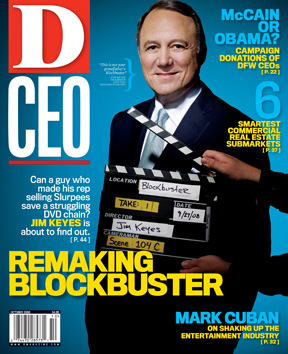They are words that no executive wants to hear from the receptionist: “Federal agents are here to see you.” Yet in today’s business climate, these words are spoken with increasing frequency as investigations into potential white-collar crime become more commonplace. Whether it’s allegations of wire fraud, tax evasion, or antitrust violations, more and more companies are finding themselves in the government crosshairs.
Take the practice of backdating stock options at the lowest recent level in order to maximize executives’ compensation. While not necessarily illegal, backdating can result in criminal and civil liability when it is misrepresented to shareholders or a board of directors. Dallas’ Affiliated Computer Services Inc. lost its CEO and CFO as a result of the computer firm’s own investigation into backdated options. Irving-based consulting outfit Thomas Group Inc. and CEC Entertainment Inc. (the parent of Chuck E. Cheese’s restaurants) were both the subject of SEC investigations and internal probes before being cleared of wrongdoing. It cost CEC up to $35 million in additional expense.
North Texas retailer Michaels Stores Inc., dairy giant Dean Foods Inc., and watchmaker Fossil Inc. have all weathered stock-option backdating investigations prompted by shareholder lawsuits. Plano chipmaker Microtune Inc. didn’t fare as well. Despite an internal investigation that cleared executives of wrongdoing while identifying certain backdating problems, Microtune and two of its former senior officers (former chairman and CEO Douglas J. Bartek and former general counsel and CFO Nancy Richardson) were charged by the SEC in June with “perpetrating a fraudulent and deceptive stock-option backdating scheme that awarded themselves and other employees millions of dollars in undisclosed compensation.” Although Microtune itself has agreed to settle the SEC charges, the case against the two former executives continues.
Stock-option backdating isn’t the only thing getting North Texas companies in hot water. Both Plano-based Cadbury Schweppes Americas and Dallas’ Reddy Ice have been the targets of multiple lawsuits alleging price-fixing and breaking federal unfair competition laws. Meanwhile, nothing grabs local headlines quite like allegations of public corruption. Both the DISD and Dallas City Hall figures like former Mayor Pro Tem Don Hill have been rocked this year by bribery and corruption scandals that began with FBI investigations in 2005.
So, what should executives do when the feds come knocking? The first step is to get the right lawyer—right away. “This is not the time to cheap out,” says Matthew Orwig, managing partner of the Dallas office of Sonnenschein, Nath & Rosenthal LLP. “You need to push the ‘high-alert’ button immediately and contact outside counsel.”
Orwig should know; he’s been on both sides of the white-collar game. He worked at the U.S. Department of Justice for 20 years prosecuting white-collar cases, and from 2002 to 2007 served as U.S. attorney for the Eastern District of Texas. Orwig currently represents such clients as Southwest Airlines (in connection with investigations into FAA safety inspections) and Cheryl Potashnik, one of the defendants in the Dallas City Hall bribery case.
Criminal defense attorney Barry Sorrels echoes Orwig’s advice. “This is no time for self-help,” he says. “Once someone becomes a target or subject of a criminal investigation where an indictment is a realistic possibility, it’s time to bring a federal criminal trial lawyer on board.” A partner in Dallas’ Sorrels, Udashen & Anton, Sorrels has current clients including an executive facing federal charges of Medicaid fraud for alleged overbilling, a mortgage company executive indicted for bank fraud, and oil and gas executives being investigated for alleged embezzlement of investor funds.
INCENTIVE FOR THE GOVERNMENT
Besides keeping one’s mouth shut and getting the right lawyer involved as early as possible, Orwig and Sorrels sound other cautionary notes for executives who suddenly find the feds at their door. No matter how baseless the accusations may seem, the lawyers recommend against proceeding with business as usual. As disruptive to office routine as an investigation or subpoena may prove to be, both attorneys emphasize the importance of preserving documents. “You should defer even routine, scheduled document destruction,” Orwig says. “It only gives the government more incentive if they learn of such destruction.” Sorrels concurs, pointing out that disposing of documents, however innocuously, can lead to obstruction of justice charges, which he characterizes as “always easier to prove than the underlying offense.”
So, what can you do to avoid being the target of criminal charges in the first place? Having good compliance programs is one key, and it’s one of the first things the government will look at. Not only will this help a company and its executives to be proactive (and self-report if necessary), it can help distinguish whether an alleged transgression is “just a rogue effort, or part of an orchestrated plan,” Orwig says. You should also be sensitive to audit issues, or any transaction that seems structured to hide the nature of the transaction itself.
It’s also wise to prepare for the worst by working with your information technology professionals to have redundancy plans in place so that there’s business continuity if agents seize computers and documents. “It’s seldom a high priority for the government to care about the consequences of seizing records,” Orwig says. Having a contingency plan in place can help keep a company functioning smoothly, even in the face of white-collar criminal investigations or charges.
In today’s business climate, two things are certain. First, corporations and their executives will continue to be attractive targets for the feds. With the growing attention on climate change, for example, Orwig sees a trend toward “greater environmental enforcement—investigating a company’s potential violations of the Clean Air Act, Clean Water Act, and other environmental regulations.” He also predicts that securities fraud will be a growth area and anticipates a “greater intensity of immigration crackdowns” such as that experienced by Swift Foods. Sorrels, meantime, sees mortgage and lender fraud leading the way in years to come, as the “subprime lending debacle” results in “a limitless pit of potential future federal prosecutions, from Wall Street to the employees who took the original loan applications.”
The other guarantee is that defending such matters won’t come cheap. Anti-virus software maker McAfee Inc. incurred more than $12 million in legal fees when its former CFO, Prabhat Goyal, was tried for fraud after a three-year Department of Justice investigation into McAfee’s accounting practices. Goyal was convicted in May 2007, and the hefty price tag that accompanied the defense prompted a separate lawsuit in federal court in Texas brought by McAfee against Goyal’s defense attorneys at WilmerHale. While the lengthy defense involved the production and review of 1.2 million documents, McAfee criticized the law firm as “unrepentant in its greed.” Former HealthSouth CEO Richard Scrushy’s defense on fraud charges (which culminated in an acquittal) reportedly cost $31 million.
With the investigation and prosecution of white-collar crime increasing in both frequency and media scrutiny, it’s become more important than ever to know what to do when federal agents are at the door. A company’s financial health, and an executive’s personal liberty, may be riding in the balance.






